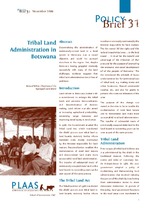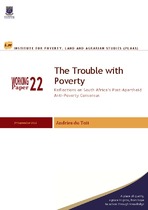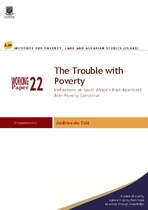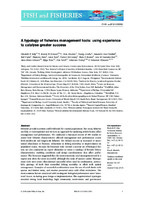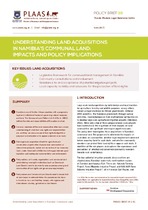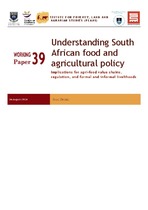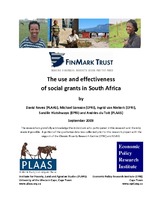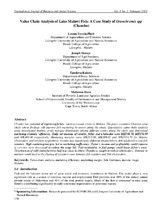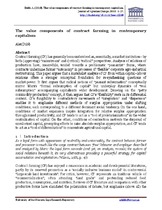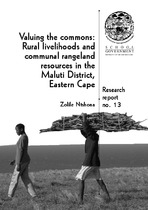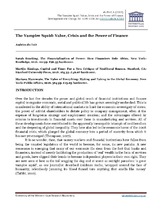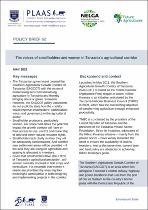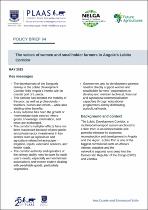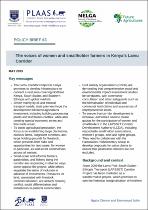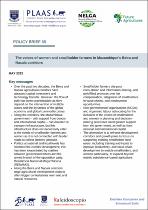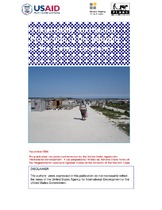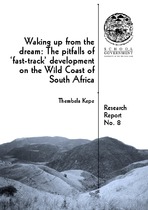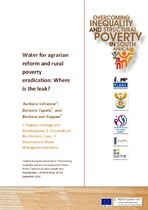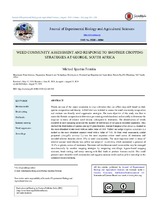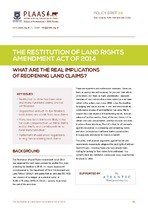Browsing Institute for Poverty, Land and Agrarian Studies (PLAAS) by Title
Now showing items 565-584 of 608
-
Tribal land administration in Botswana
(PLAAS, University of the Western Cape, 2009-11)Decentralising the administration of communally-owned land to a local system in Botswana was a sound objective and could be pursued elsewhere in the region. Yet, despite Botswana having grappled relatively successfully ... -
The trouble with poverty: reflections on South Africa's post-apartheid anti-poverty consensus
(PLAAS, University of the Western Cape, 2012)This paper considers the state of poverty discourse in South Africa since 1994: the ideological frameworks, narratives and assumptions that have shaped the construction of poverty as an object of academic knowledge, ... -
The trouble with poverty: Reflections on South Africa’s post-apartheid anti-poverty consensus
(Institute for Poverty, Land and Agrarian Studies, University of the Western Cape, 2012-09)This paper considers the state of poverty discourse in South Africa since 1994: the ideological frameworks, narratives and assumptions that have shaped the construction of poverty as an object of academic knowledge, ... -
A typology of fisheries management tools: using experience to catalyse greater success
(John Wiley & Sons, 2016)Fisheries provide nutrition and livelihoods for coastal populations, but many fisheries are fully or over-exploited and we lack an approach for analysing which factors affect management tool performance. We conducted a ... -
Understanding land acquisitions in Namibia’s communal land: Impacts and policy implications
(Institute for Poverty, Land and Agrarian Studies, University of the Western Cape, 2015)Large-scale land acquisitions by both foreign and local investors for agriculture, forestry and wildlife purposes, among others, remain a major challenge for African governments. Between 2000 and 2011, the Namibian ... -
Understanding South African food and agricultural policy: Implications for agri-food value chains, regulation, and formal and informal livelihoods
(Institute for Poverty, Land and Agrarian Studies, University of the Western Cape, 2016-08)In order to create credibility and sustainability between policies, to avoid political confusion and to reassure “investor confidence”, a clear agri-food policy package needs to be in place. To achieve this, policy ... -
The use and effectiveness of social grants in South Africa
(Institute for Poverty, Land and Agrarian Studies, University of the Western Cape, 2009)This research examines the effectiveness of social grants in South Africa, and how recipients use their grants. As a form of social protection, social grants not only ameliorate poverty and provide a safety net, they ... -
Value chain analysis of Lake Malawi fish: a case study of Oreochromis spp (Chambo)
(Center for Promoting Ideas (CPI), 2013)Chambo has potential of improving fishers’ socio-economic status in Malawi. The paper examines Chambo value chain whose findings will improve fish marketing by actors along the chain. Quantitative value chain analysis used, ... -
The value components of contract farming in contemporary capitalism
(Wiley, 2018)Contract farming (CF) has generally been understood as, essentially, a market institution—by both (approving) “mainstream” and (critical) “radical” perspectives. Analyses of relations of production have, meanwhile, tended ... -
Valuing the commons: Rural livelihoods and communal rangeland resources in the Maluti District, Eastern Cape
(Institute for Poverty, Land and Agrarian Studies, University of the Western Cape, 2002)The ‘hidden’ value of wild resources, trees and grazing resources on communal rangelands is often overlooked by conventional economic assessments, even though their contribution to people’s lives is enormous. There is ... -
The vampire squid: Value, crisis and the power of finance
(Wiley, 2019)Over the last five decades the power and global reach of financial institutions and finance capital to organize economic, social and political life has grown seemingly unchecked. This is manifested in the ability of ... -
The voices of smallholders and women in Tanzania’s agricultural corridor
(UWC PLAAS, 2023)The Tanzanian government created the Southern Agricultural Growth Corridor of Tanzania (SAGCOT) with the vision of modernising and commercialising agriculture in Tanzania and thereby bringing about a ‘green revolution’. However, ... -
The voices of women and smallholder farmers in Angola’s Lobito Corridor
(UWC PLAAS, 2023)The development of the Benguela railway in the Lobito Development Corridor links Angola’s interior with its coastal port of Luanda. This corridor has boosted the mobility of the poor, as well as professionals –teachers, ... -
The voices of women and smallholder farmers in Kenya’s Lamu Corridor
(UWC PLAAS, 2023)The Lamu Corridor Project in Kenya promises to develop infrastructure to connect a vast area covering Northern Kenya, South Sudan, and Southern Ethiopia with global markets. Driven mainly by oil and mineral transport ... -
The voices of women and smallholder farmers in Mozambique’s Beira and Nacala corridors
(UWC PLAAS, 2023)Over the past two decades, the Beira and Nacala agricultural corridors have attracted capital investment and technology transfer. However, the flow of both has been unpredictable as they depend on the intervention of ... -
Vulnerability and social protection at the margins of the formal economy
(Institute for Poverty, Land and Agrarian Studies, University of the Western Cape, 2006)This report sets out the results of an in-depth study of livelihood strategies and ‘coping mechanisms’ among poor people in one very specific, but highly significant context of poverty in South Africa. Its core concrete ... -
Waking up from the dream: The pitfalls of 'fast-track' development on the Wild Coast
(Institute for Poverty, Land and Agrarian Studies, University of the Western Cape, 2001)The main aim of this study was to explore the issues involved in reconciling the policy objectives of land reform, environmental conservation and the private sector profit-oriented rural development initiative in ... -
Water for agrarian reform and rural poverty eradication: Where is the leak?
(Institute for Poverty Land and Agrarian Studies (PLAAS), 2010)The distribution of water use is undoubtedly the sharpest inequality inherited from the past in South Africa, with a Gini Coefficient of 0.96 and higher. Unfortunately, as the review in this paper suggests, the gap is even ... -
Weed community assessment and response to smother cropping strategies at George, South Africa
(Editorial board of Journal of Experimental Biology and Agricultural Sciences, 2020)Weeds are one of the major constraints to crop cultivation that can affect crop yield based on their species composition and density. A field trial was initiated to assess the weed community composition and evaluate ... -
What are the real implications of reopening land claims?
(Institute for Poverty, Land and Agrarian Studies, University of the Western Cape, 2014)The Restitution of Land Rights Amendment Act of 2014 has reopened the land claims process for another five years, extending the deadline to 2019. An impact assessment commissioned by the Department of Rural Development ...

